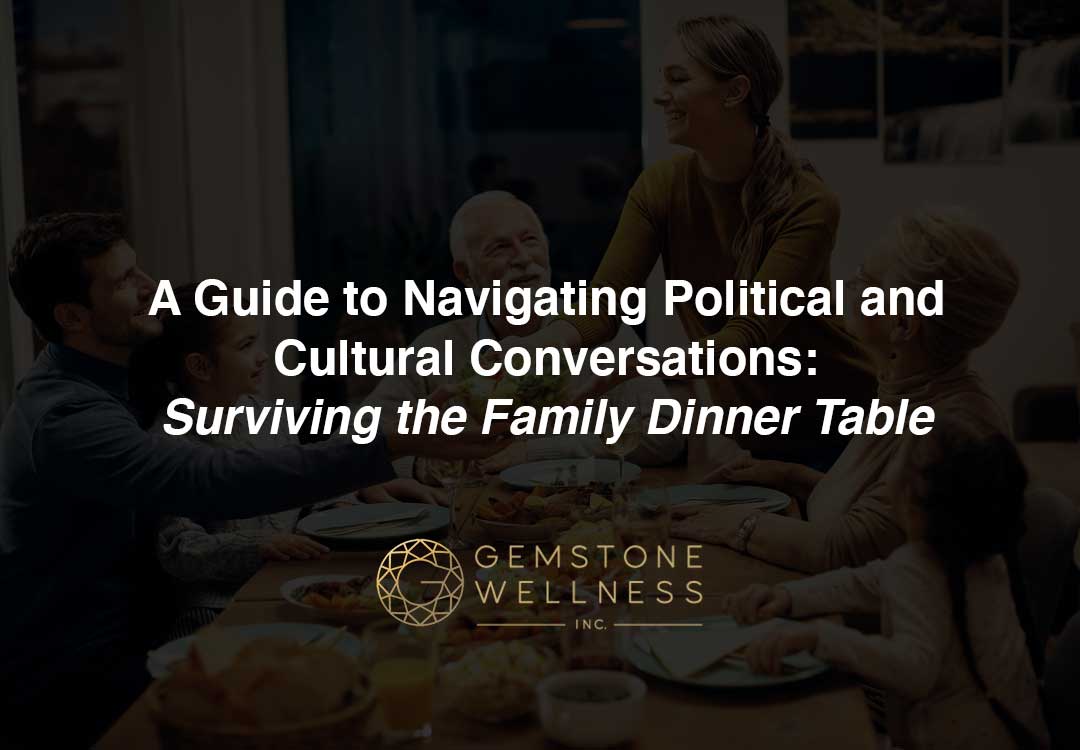Title: A Guide to Navigating Political and Cultural Conversations: Surviving the Family Dinner Table
Stephanie Hernandez, LPC
A Thought For Our Readers:
As we approach another season of family gatherings and the holiday season, there’s a collective sense of pause, holding our breath and wondering what potentially could come next, especially in a time where there can be political and cultural divides that grow each year. In a time where the holidays often bring people together, this year could be different with noticeable tension in the air; you may even find yourself walking on eggshells, wondering how to connect with family and loved ones with different views, or does it become the elephant in the room.
How do we make space for bracing for difficult conversations and acknowledging our feelings? I want to remind you that you’re not alone in this; it’s okay for uncomfortable emotions to come up and to feel overwhelmed, uncertain, frustrated, sad, and even disappointed. It’s okay to feel uneasy when trying to make sense of the world and trying to foster communication and connection. I hope this blog can help make difficult conversations feel less overwhelming and help you stay grounded with family and friends this holiday season.
Setting Boundaries Before You Sit Down
“Tell people what you need.” – Nedra Glover Tawwab
As you prepare for the family dinner, consider what you can control. While you can’t predict how conversations will unfold, you can decide how to engage—or disengage—when topics like politics or culture arise. Setting boundaries doesn’t mean avoiding difficult conversations altogether. It means recognizing your emotional limits and choosing when and how to participate.
For example, you might decide you won’t engage in political debates at the dinner table but will save that for a more private conversation with a family member later. You might feel comfortable speaking up, but only if the conversation stays respectful and doesn’t escalate into an argument. Setting these boundaries ahead of time can provide clarity and reduce stress when the conversation gets heated.
Implementing Emotional Regulation
Take a deep breath. Emotions can run high during family gatherings, and it can be nerve-racking to anticipate when somebody will bring up sensitive subjects will be brought up. Take a moment to breathe deeply. Family gatherings can stir up strong emotions, and it can be stressful to think about potentially sensitive topics that might come up. Feeling this way is entirely valid.
A simple emotional regulation technique is the RAIN acronym, which was introduced by meditation teacher Michele McDonald and which psychologist Tara Brach later built upon and refined. The tool is as follows:
– Recognize what you’re feeling
– Acknowledge what you’re feeling
– Investigate those feelings with kindness
– Identify what you need
If needed, find a quiet moment to softly excuse yourself and find a quiet place to practice deep breathing exercises. Allow yourself to take a deep breath, hold, and exhale.
Find Common Ground
In a world that often feels divided, focusing on what separates us rather than what connects us can be easy. But finding common ground—even on small things—can help de-escalate tension and create a sense of connection.
There may be moments when you disagree with family on political issues, but perhaps you share a common interest with sports, hobbies, music, or family traditions. Despite differences of opinion, concentrating on common interests fosters healthy relationships. Small, intimate moments frequently highlight our similarities and deepen our connections. Together, let’s celebrate those!
Know When to Walk Away
There may be occasions when the discussion and effort are no longer worthwhile if everything else fails. If the conversation becomes heated and disrespectful, it might be best to leave. Your top priorities should be keeping the peace and preserving your emotional health during the holidays.
Walking away from a situation that negatively impacts you is totally acceptable, particularly if it is detrimental to your mental health. Keep in mind that you are not required to take part in every conversation. It’s critical to pick your battles carefully and know when retreating is the best course of action.
In Conclusion: Navigating the Holidays with Compassion
Family gatherings during the holidays can feel like a balancing act between maintaining peace and trying to limit and reduce stress. There may be times when discussing can build slight tension. It’s perfectly acceptable to re-establish your boundaries and take a break when these events become too stressful.
The holiday season is a time to connect, share joy, and recharge. While political and cultural discussions are inevitable, staying calm, respectful, and grounded allows you to navigate the family dinner table with empathy and grace.

